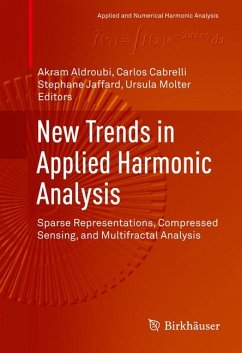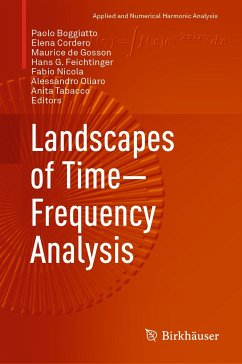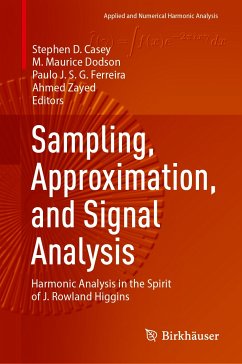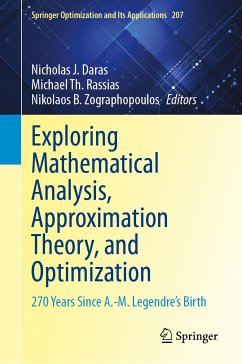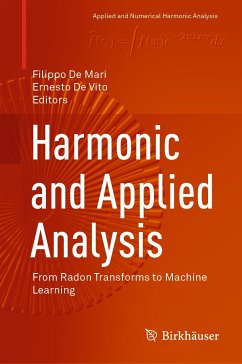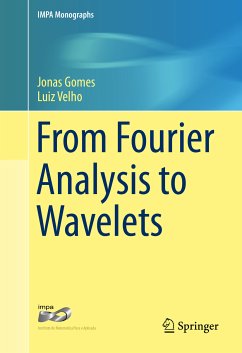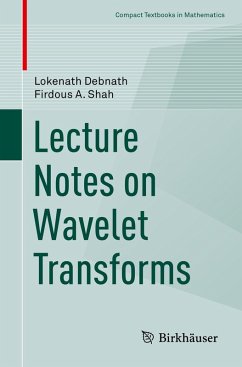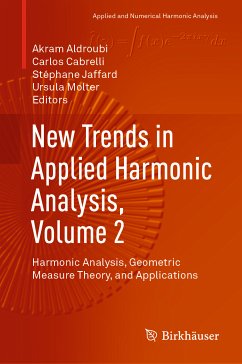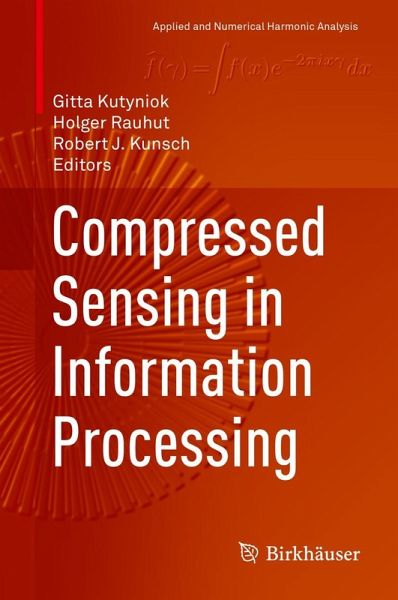
eBook, PDF
Compressed Sensing in Information Processing (eBook, PDF)
Versandkostenfrei!
Sofort per Download lieferbar
Weitere Ausgaben:

PAYBACK Punkte
56 °P sammeln!





This contributed volume showcases the most significant results obtained from the DFG Priority Program on Compressed Sensing in Information Processing. Topics considered revolve around timely aspects of compressed sensing with a special focus on applications, including compressed sensing-like approaches to deep learning; bilinear compressed sensing - efficiency, structure, and robustness; structured compressive sensing via neural network learning; compressed sensing for massive MIMO; and security of future communication and compressive sensing.
Dieser Download kann aus rechtlichen Gründen nur mit Rechnungsadresse in A, B, BG, CY, CZ, D, DK, EW, E, FIN, F, GR, HR, H, IRL, I, LT, L, LR, M, NL, PL, P, R, S, SLO, SK ausgeliefert werden.
¿Prof. Dr. Gitta Kutyniok currently has a Bavarian AI Chair for Mathematical Foundations of Artificial Intelligence at the Ludwig-Maximilians Universität München. She received her Diploma in Mathematics and Computer Science as well as her Ph.D. degree from the Universität Paderborn in Germany, and her Habilitation in Mathematics in 2006 at the Justus-Liebig Universität Gießen. From 2001 to 2008 she held visiting positions at several US institutions, including Princeton University, Stanford University, Yale University, Georgia Institute of Technology, and Washington University in St. Louis, and was a Nachdiplomslecturer at ETH Zurich in 2014. In 2008, she became a full professor of mathematics at the Universität Osnabrück, and moved to Berlin three years later, where she held an Einstein Chair in the Institute of Mathematics at the Technische Universität Berlin and a courtesy appointment in the Department of Computer Science and Engineering until 2020. In addition, Gitta Kutyniok holds an Adjunct Professorship in Machine Learning at the University of Tromso since 2019. Gitta Kutyniok has received various awards for her research such as an award from the Universität Paderborn in 2003, the Research Prize of the Justus-Liebig Universität Gießen and a Heisenberg-Fellowship in 2006, and the von Kaven Prize by the DFG in 2007. She was invited as the Noether Lecturer at the ÖMG-DMV Congress in 2013, the Hans Schneider ILAS Lecturer at IWOTA in 2016, a plenary lecturer at the 8th European Congress of Mathematics (8ECM) in 2021, and the lecturer of the London Mathematical Society (LMS) Invited Lecture Series in 2022. Moreover, she will give invited lectures at the International Congress of Mathematicians (ICM) 2022 and at the International Congress on Industrial and Applied Mathematics (ICIAM) 2023. She also became a member of the Berlin-Brandenburg Academy of Sciences and Humanities in 2017, a SIAM Fellow in 2019, and a Simons Fellow at the Isaac Newton Institute in 2021; she received an Einstein Chair at TU Berlin in 2008, a Francqui Chair of the Belgian Francqui Foundation in 2020, and holds the first Bavarian AI Chair at LMU from 2020 on. She was Chair of the SIAM Activity Group on Imaging Sciences from 2018-2019 and Vice Chair of the new SIAM Activity Group on Data Science in 2021, and currently serves as Vice President-at-Large of SIAM. She is also the main coordinator of the Long-Term Programme on "Mathematics of Deep Learning" at the Isaac Newton Institute in 2021 and of the Research Focus "Next Generation AI" at the Center for Advanced Studies at LMU from 2021 to 2023. Gitta Kutyniok's research work covers, in particular, the areas of applied and computational harmonic analysis, approximation theory, artificial intelligence, compressed sensing, frame theory, imaging sciences, inverse problems, machine learning, numerical analysis of partial differential equations, and applications to life sciences and telecommunication. She is primarily interested in developing mathematical methodologies and associated theories to solve application motivated problems. The most significant of Gitta Kutyniok's contributions is perhaps the introduction of the directional multiscale system of shearlets (www.ShearLab.org) and a comprehensive theoretical approach to analyze sparse regularization of inverse problems using harmonic analysis and microlocal analysis. In 2015, she entered the area of machine learning, aiming to develop a theoretical foundation for deep learning, also for its application within mathematics. In this direction, some of her most well-known contributions are the analysis and construction of memory-optimal deep neural networks by using classical approximation theory as well as a theoretical analysis of deep neural networks and parametric partial differential equations. Another focus of hers is on optimal combinations of model- and data-based approaches, where she, for instance, developed a state-of-the-art algorithm for the limited-angle computed tomography problem using a combination of deep neural networks and sparse regularization by shearlets. Prof. Dr. Holger Rauhut has studied mathematics at the Technical University of Munich from 1996 until 2001, where he also obtained his doctoral degree in mathematics in 2004 with a thesis related to time-frequency and wavelet analysis. After a short postdoc at the University of Wroclaw in 2005, he moved to the Numerical Harmonic Analysis Group at the University of Vienna, where he obtained his habilitation degree in mathematics in 2008. In the same year, he became temporary associate professor ("Bonn Junior Fellow") at the Hausdorff Center for Mathematics at the University of Bonn. Since 2013 he is full professor for Mathematics at RWTH Aachen University leading the Chair for Mathematics of Information Processing. From 2016 to 2018 he was the spokesperson of the Department of Mathematics of RWTH and since 2018 he is member of the Senate of RWTH. His research interests include compressive sensing, applied harmonic analysis, random matrices and mathematics of deep learning. Together with Prof. Simon Foucart he authored a monograph entitled "A Mathematical Introduction to Compressive Sensing", which appeared in 2013. Since 2018 he serves as co-spokesperson, jointly with Prof. Dr. Gitta Kutyniok, of the DFG priority program SPP1798 "Compressive Sensing in Information Processing". Dr. Robert J. Kunsch has studied Mathematics at the Friedrich Schiller University Jena from 2009 until 2014. His doctoral degree in mathematics was obained in 2017, also in Jena, the thesis dealing with Monte Carlo methods for high-dimensional function approximation. Spending two years as a postdoctoral researcher in Osnabrück, from 2019 on he is member of the Chair for Mathematics of Information Processing lead by Prof. Dr. Holger Rauhut at the RWTH Aachen University. His research interests comprise Monte Carlo methods as well as mathematics of deep learning.
Produktdetails
- Verlag: Springer Nature Switzerland
- Seitenzahl: 542
- Erscheinungstermin: 20. Oktober 2022
- Englisch
- ISBN-13: 9783031097454
- Artikelnr.: 66217204
Für dieses Produkt wurde noch keine Bewertung abgegeben. Wir würden uns sehr freuen, wenn du die erste Bewertung schreibst!
Eine Bewertung schreiben
Eine Bewertung schreiben
Andere Kunden interessierten sich für


